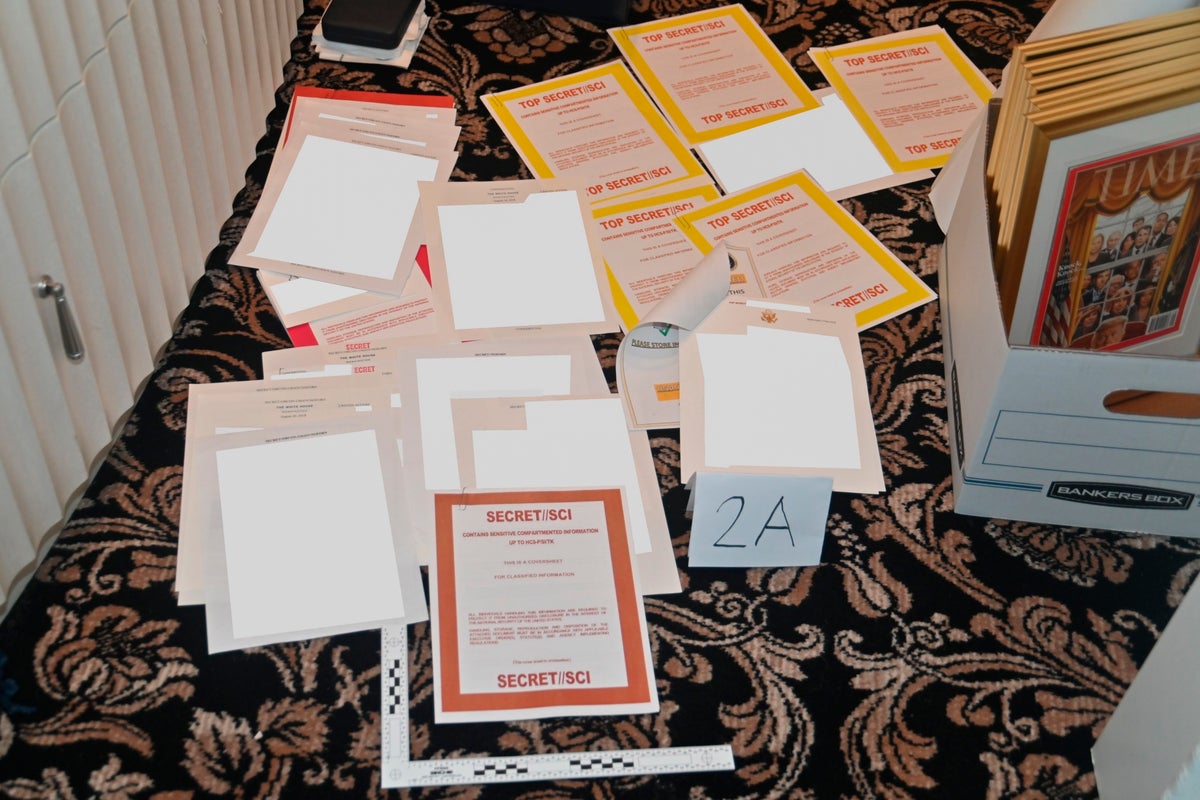
Prosecutors with the Justice Department’s national security division aggressively pushed back on former president Donald Trump’s claim that non-classified White House records seized during the 8 August search of his Palm Beach, Florida home had been designated “personal” records by virtue of their removal from the White House.
The new salvo was made in a filing before the New York judge charged with determining whether any of the documents are protected by legal privileges.
In a legal brief filed before Judge Raymond Dearie on 8 November, Mr Trump’s lawyers argued that a district court opinion from a 2012 case, Judicial Watch v National Archives and Records Administration, gives the ex-president plenary authority to designate any records he so desires as “personal” and thereby place them out of reach of the Archives.
The 2012 case was centred around a set of audio tapes commissioned by former president Bill Clinton as an “oral history” of his administration, akin to a personal diary made with the help of a historian. The conservative group Judicial Watch sued the Archives in hopes of forcing Mr Clinton to turn over the tapes so the group could make use of them. But the district judge who heard the case ruled that Mr Clinton had the authority under the Presidential Records Act to designate the tapes in question as personal records, which the PRA defines as “all documentary materials . . . of a purely private or nonpublic character which do not relate to or have an effect upon the carrying out of the constitutional, statutory, or other official or ceremonial duties of the President”.
Mr Trump’s lawyers claimed that the then-president “was still serving his term in office when the documents at issue were packed, transported, and delivered to his residence,” and argued that the records in question are therefore “presumptively personal”.
They further argued that Mr Trump’s decision to transport the records to Mar-a-Lago “unequivocally confirmed that he was treating the materials in question as personal records, rather than Presidential records”.
In their response, Justice Department prosecutors took aim at Mr Trump’s “shifting arguments,” which they said “belie the immovable realities of the record”.
They noted that the twice-impeached ex-president had brought the civil lawsuit which led to Judge Dearie’s appointment as special master “with the professed aim of ‘preserv[ing] the sanctity of executive communications and other privileged materials,’” and pointed out that Mr Trump had now conceded that just one document in question may be properly protected by attorney-client privilege, with just 16 documents possibly protected by executive privilege.
“In lieu of making viable privilege claims, Plaintiff now asserts that the overwhelming majority of documents—more than 97% of the total seized—qualify as his ‘personal’ records under the PRA. Even if correct (which it is not), that characterization amounts to a red herring in this proceeding. Documents commingled or collectively stored with the classified materials located at Plaintiff’s premises were lawfully seized by the FBI in accordance with the terms of the court-authorized search warrant because of their relevance to the government’s ongoing investigation,” prosecutors said.
They added that Mr Trump’s “efforts to sidetrack these proceedings with irrelevant questions can readily be dispatched” because Mr Trump has alredy “distinguished between records that he claims to have a genuine basis for designating as ‘personal’ within the meaning of the Presidential Records Act ...and those that he claims are ‘personal’ based on nothing other than attorney say-so and tautological reasoning”.
“Neither the PRA nor the single district court decision on which Plaintiff’s argument rests gives him the sweeping authority he claims to convert governmental records into ‘personal’ property simply by the act of removing them from the White House,” they said.
Continuing, the Justice Department accused Mr Trump’s attorneys of having “repeatedly mischaracteris[ed]” why the documents had been seized in the first place and stressed that the 8 August search of the ex-president’s home and office “was undertaken in connection with an ongoing national security and criminal investigation into potential violations of federal criminal statutes prohibiting, inter alia, the unlawful retention of national defense information, obstruction of justice, and the willful removal of government records”.
“The government’s compelling need for these materials is plain, and the Special Master should reject Plaintiff’s attempts to use vague and unsupported assertions to further delay the investigation,” they said.







